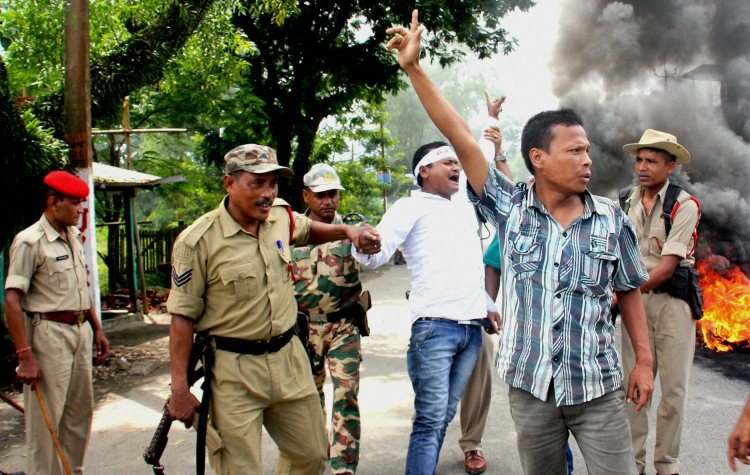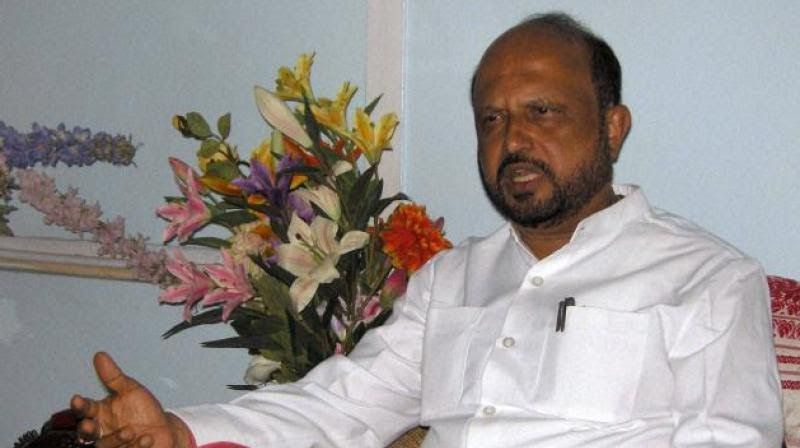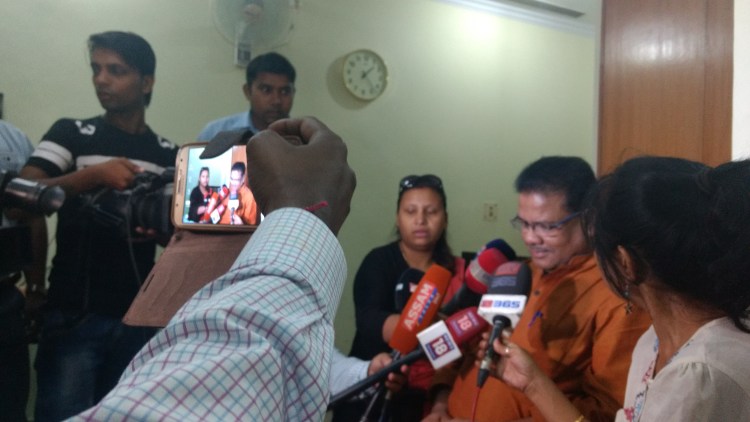Rising Anger in Assam Over Centre’s Decision To Grant Citizenship To Hindu Migrants From Bangladesh
Dozens of ethnic and political organisations in the state fear that the Centre’s decision, which violates the Assam Accord, could result in the marginalisation of its indigenous people.
Asom Jatiyatabadi Yuva Chatra Parishad activists and others in Tinsukia, Assam protesting the Modi government’s decision to grant refugee status to Hindu immigrants from Bangladesh. Credit: PTI

New Delhi: Five months into its rule in Assam, the Bharatiya Janata Party (BJP) is beginning to feel the heat. The simmering anger against the Narendra Modi government’s decision to revise the Citizenship (Amendment) Act, 1955, has reached its boiling point.
The BJP, which won a rousing victory in the state in May with promises of protection of “jati, mati, bheti” – community, land and existence – to its indigenous people, is increasingly attracting public ire and opposition from dozens of ethnic and political organisations. Those opposed to the amendment say that the BJP may as well be contributing to their marginalisation in their own land.
If amended, the Act would enable the over 1.5 lakh undocumented Hindu Bangladeshis residing in the state to get Indian citizenship, which would be contradictory to the Assam Accord that deems any person – whether a Hindu or Muslim – as “illegal” if found entering the state from Bangladesh after March 24, 1971.
Clause 6A, that specifies this, was inserted into the Act by the Rajiv Gandhi government in 1985 upon the signing of the accord between the state, centre and the All Assam Students Union (AASU) in order to put a lid on six years of students’ agitation against “illegal Bangladeshi immigrants.”
The Assamese public – that hugely supported the agitation – considers the accord as an official, legal instrument that ensures the protection of their land, language and culture, and therefore deem it “inviolable.
The proposed Citizenship (Amendment) Bill, 2016 – introduced by the Modi government first in December 2014 – will grant Indian citizenship not only to the Bengali Hindus from Bangladesh, but also to all Hindus, Parsis, Christians, Buddhists and Sikhs of Pakistan and Afghanistan, who are seeking refuge in India “due to religious persecution or fear of religious persecution.”
It also reduces their period of stay in India required to become eligible for citizenship from 11 years to six years.
Soon after the central government issued a notification to this effect to the Tarun Gogoi government in September 2015, the powerful student bodies of the state – AASU and the Asom Jatiyatabadi Yuva Satra Parishad (AJYCP) – hit the streets announcing their strong opposition to it.
Several protests were held demanding the implementation of the accord. As many as 26 ethnic organisations and student bodies joined AASU in this protest under an umbrella organisation called the Assam Andolan Sangrami Aikya Mancha.
Speaking to The Wire, AASU general secretary Lurin Jyoti Gogoi not only reiterated the continued support and “unity” of these organisations on the issue, but also added that “Many other organisations and influential tribal literary bodies of the state, besides the general public, have joined the protest against the Bill.”
“We were waiting for the Durga Puja festivities to get over and will very soon restart a series of protests against the central decision. For us, the accord is sacrosanct.”
Last year – in reaction to the notification – AASU advisor Samujjal Bhattacharya articulated the stand of the organisation by saying that “AASU has no objection if the Centre decides to give citizenship to the Hindu Bangladeshis residing in the state, but they have to be distributed elsewhere.”
“Assam can no longer be the dumping ground for Bangladeshi migrants. Assam took a lot of refugees during and after partition and during the 1971 [Bangladesh] war. It is after all a small state with a high unemployment rate. These people can be given space in some other state.”
A BJP source from the state, however, told The Wire that chief minister Sarbananda Sonowal “has good relations with Bhattacharjee (he was a contemporary of Sonowal in the AASU) and is likely to make him agree to the central decision.”
Gogoi, however, repeated last year’s demand that was put forth by Bhattacharjee.
“Assam took the burden of refugees on behalf of the country on humanitarian grounds, this time the rest of India should do it,” he told this correspondent.
During his 2014 Lok Sabha campaign trail in Assam, Modi said in a rally in Silchar that all of the states, and not just Assam, should share the burden of providing shelter to the Bangladeshi Hindus.
‘Only way to prevent Muslims becoming a majority’
However, there was a strong hint of dilution of that stand by the BJP on October 6 when state finance minister and the de facto number two in the state government, Himanta Biswa Sarma, made an attempt in the local media to argue the need for the migrants to remain in Assam. Sarma told reporters that granting citizenship to the Hindu Bangladeshis would benefit Assam as it would prevent Muslims from becoming the majority community.
“Hindus constitute about 68% of the state’s population. Considering the rapid population growth, particularly among immigrant Muslims, the community is all set to become a majority in the state in the coming days. Under such circumstances, granting citizenship to Hindu migrants from Bangladesh will prevent Assam from becoming a Muslim-dominated state,” he said.
AASU reportedly asked Sarma to stay away from “dishonouring the constitution” and to stop giving “such absurd logic in the future” to undermine the accord.
“It is absurd. Didn’t he take the oath of office by pledging to uphold the Indian constitution? The constitution says we are a secular country, no religion is superior to another, and yet he is openly justifying bringing in an amendment on religious lines. Nowhere in our constitution has it been mentioned that citizenship be granted on religious lines. The accord doesn’t differentiate an illegal immigrant on religious lines, it has been AASU’s stand, so we will not compromise on it,” Gogoi later told The Wire. He said, “Constitutional experts consulted by the joint parliamentary committee (established by the Centre in August under the leadership of BJP MP Satyapal Singh to hear representations of the stakeholders) clearly said the amendments violate the constitution.”
According to a local newspaper editor who wished to remain anonymous, “By granting citizenship to Hindu Bangladeshis, the BJP is trying to change the pattern of voting in Assam. While it is trying to consolidate the Hindu vote on one hand, it is also trying to break the Muslim vote on the other. By terming only the Bengali Muslims as outsiders and the enemy of Assamese people, it is also trying to wipe out the traditional voter base of Congress and All India United Democratic Front. If such voters are deemed illegal, BJP’s electoral success is assured in the state for some more time. But this political game plan will cost the Assamese in the long run. It will make the Bengali Hindus a strong, distinct voter base in the state.”
Sonowal, often termed as the jatiyo nayak (community leader) in the state for successfully fighting the Illegal Migrant (Determination) Act, 1983 through a petition in the Supreme Court in 2005 (the Act put the onus on the state to prove a person “illegal”), has not yet directly engaged with the issue of accommodating the Hindu Bangladeshis within the state against whom he once took a strong stand.
He has only said that “encroachers will not be tolerated,” hence being ambivalent on whether he now considers only Muslim Bangladeshis as “encroachers.”
Although Sonowal’s former party, Asom Gana Parishad – born out of the accord comprising student leaders who spearheaded the anti “illegal Bangladeshi” agitation – has also not taken an official stand against the Centre’s decision (the AGP is a part of the BJP government in the state), one of its top leaders and former state chief minister Prafulla Kumar Mahanta has come out openly “against dilution of the accord.”

Mahanta, a signatory to the accord on behalf of AASU, signed a joined memorandum on September 24 with the Aikya Mancha and submitted it to the Joint Parliamentary Committee.
A day after submitting the memorandum in New Delhi, Mahanta, also the chief adviser to the Aikya Mancha, told The Wire, “The amendment will be disastrous for the people of Assam. The Assam Accord gives us the right to safeguard our language, culture, literature, our land. It is inviolable. So many youth gave their life for it. Anyone who entered Assam after March 24, 1971, will have to leave the state.”
On being asked why his party had not taken an official stand on the issue, Mahanta made it quite clear that he was upset at the AGP’s position. “It should. It is the duty of AGP to protect the accord; it is directly linked to its roots.”
On August 8, during question hour in the state assembly, Mahanta had a verbal duel with parliamentary affairs minister Chandra Mohan Patowary after he asked to know whether the state government “will raise its voice against any such burden [of settling Hindu Bangladeshis in Assam).”
Patowary replied, “There has been no written document by the Centre on this issue. So there is no question of any burden. If any such proposal comes in future, then we will discuss [the question].”
The Aikya Mancha has also recently filed a PIL in Gauhati high court opposing the Bill.
Meanwhile, the state Congress has also voiced its opposition to the Bill. In an informal meeting with reporters in New Delhi on Friday, Pradesh Congress Committee President Ripun Bora said, “We consider the accord to be important because it brought peace to the state after years of unrest. I had a meeting with Congress vice president Rahul Gandhi today. It is a highly sensitive issue for the Assamese people. Therefore, the Congress party is opposed to the government’s move to hurry it.”
He also said, “The party will soon have a small meeting with all the stakeholders. Whatever the stakeholders jointly suggest will be the party’s stand when the Bill comes up in [the] parliament.”
Assam PCC president Ripun Bora speaking to the media in New Delhi on Friday. Credit: Sangeeta Barooah Pisharoty

Expressing his doubt about whether AASU is “really serious about opposing the Bill,” he said, “We urge AASU, which claims to be the protector of Assamese culture, to come out clearly [on] why a petition it filed in the Supreme Court against the Bill was withdrawn on March 11, 2016, just before the state elections?”
Meanwhile, the joint committee of parliamentarians, which accepted objections and suggestions from the public, civil society groups and other organisations until September 30, has begun inviting some of them to New Delhi to present their case. This past Thursday, it was the turn of four organisations that support granting citizenship to Hindu Bangladeshis.
What the Bengali Hindu groups say
All Assam Bengali Youth Students Federation was one of them. Utpal Sarkar, its general secretary, told The Wire after the meeting, “We thanked the government for bringing the Bill. We also urged the committee members to visit Assam, to see for themselves how the Bengali Hindu refugees have been treated. Even those with proper Indian documents have been turned into doubtful voters by the foreigners’ tribunals (set up by the Supreme Court).”
“Those in the urban areas are aware of [the] law but, people in the rural areas are not, they can’t protect themselves, they are poor. So they are the most vulnerable lot, picked up by police late in the night and put in jail. Some organisations like us help them in finding lawyers and funding them but it is not possible to do for a lot of people. The doubtful voters (D-voters) are supposed to be kept in detention camps but those are actually jails.” He said, “At present, there are 120 Bengali Hindus in detention camps.”
On being asked about the rising opposition against the Bill, Sarkar said, “We will have to sit with those opposed to it and find a solution. It is no doubt a problematic issue in Assam. We have so far met Sonowal three times on the issue.”
On the question of whether the Hindu Bangladeshis would be agreeable to the Centre’s earlier proposal of distributing them outside of Assam, Sarkar said, “We feel those who voted till the last assembly elections should be kept in Assam. Whoever comes after it can be moved elsewhere. Our argument is, if those who voted are moved out, it would also mean they were so far not Indian citizens which makes the elected government unconstitutional.”
Another Assam-based organisation called by the committee was the Protection Forum for Hindu Bengalis of Assam. Its convener Kamal Dutta told this correspondent, “Assamese people should have no problem accepting us as unlike the Muslim refugees we will not assert ourselves politically (he hinted at Badarruddin Ajmal’s All India United Democratic Front). We just want to live and work there.” Dutta gave the same justification Sarma gave reporters on October 6 in Guwahati. “Muslims comprise 32% of Assam’s population, they are a bigger threat to Assamese people’s existence than us. They will make them a minority in the state, not us.”
Linguistic complexity
However, the general fear in Assam is not on the basis of religion but that of community. Historically, Bengali Hindus have been looked at with strong disapproval not just in Assam, but also in other parts of the Northeast for attempts at establishing cultural hegemony over the indigenous people. Organisations like AASU often quote “the case of Tripura” to suggest “Bengali takeover of the state and thereby making the indigenous Tripuris a minority.”
During British rule, Bengali was made the official language of Assam, much to the disapproval of Assamese people. Assamese writers like Lakshminath Bezbarua began writing only in Assamese to oppose the attempt at linguistic hegemony. According to an article in the September issue of the Economic and Political Weekly, titled ‘Literary Cultures of Northeast India,’ “Towards the second half of the 19th century, several leading intellectuals of Bengal started a debate in Bharati, Punya, Mrinmayee, Prabhashi and other Bangla journals to establish their claim that the Bangla language has attained a superior status amongst all Indian languages and weaker languages in the neighbourhood, like Asamiya (Assamese) and Oriya would inevitably lose their independent status and merge with Bangla in course of time. Significantly, the strongest voice in this debate was that of Rabindranath Tagore whose views on the Asamiya language were vigorously challenged by the greatest Asamiya writer of the time, Lakshminath Bezbarua.”
In the 1960s, the Bengali-dominated Barak Valley of Assam also saw a violent language movement in protest against the decision of the state government to make Assamese the only official language of the state.
With such a history behind it, the Assamese public and civil society organisations look at the decision of the Centre more as an “attempt” at marginalising the Assamese language and culture in the state by increasing the population of Bengali Hindus in the state.
“Already the Census reports since 2001 have been pointing out that there are now less than 50% Assamese speakers in the state. By increasing the number of Bengali speakers, it will become worse,” said Gogoi.
Speaking to The Wire in April, Northeast expert Sanjoy Hazarika said, “We forget that lot of Bengali speaking people (read Muslims) adopted Assamese as their mother tongue. This has ensured that Assamese is a linguistic majority in the state. If hostility towards them continues, I wonder how many will show Assamese as their mother tongue. It will certainly affect the status of Assamese as an official language of Assam.” Many in Assam point this out too by adding, “The Hindu Bengalis will never do it.”
The Aikya Mancha, Gogoi said, has sought time from the parliamentary committee to state many such points that may “compromise Assamese language and culture in future.”
“We have not heard from it though,” he said.
According to a state government source, “The committee received over 9,000 applications for and against it. So it will take a while to hear everyone.” This means the Bill will not come up for discussion in the winter session.
Kamal Dutta said, “Even if the Bill gets passed in parliament after some time, I fear that its implementation will not be easy in Assam. Assamese people will remain opposed to it and create hurdles.”
Source: http://thewire.in



